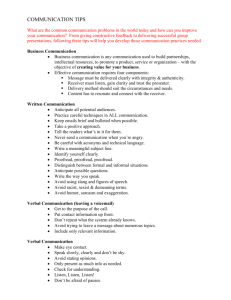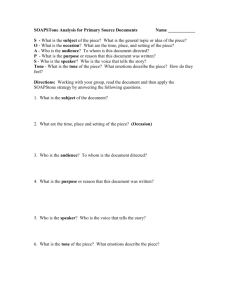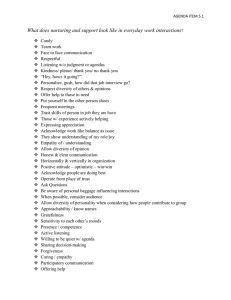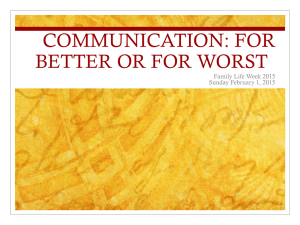Phil Holberton ‘The Voice of Your Leadership’ S E
advertisement
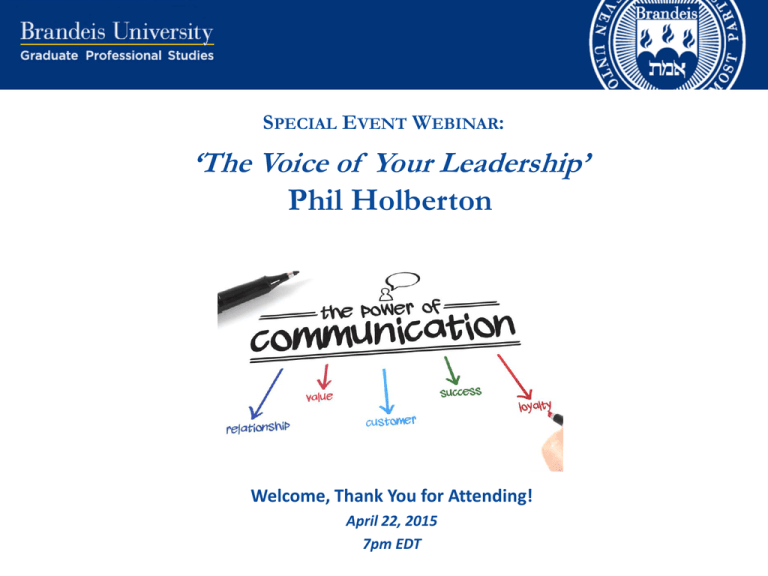
SPECIAL EVENT WEBINAR: ‘The Voice of Your Leadership’ Phil Holberton Welcome, Thank You for Attending! April 22, 2015 7pm EDT Online Open House: • You are in listen-only mode • You can raise your hand or use an emoticon using the icon at the top left of your screen. • Type text in the Chat area to send a message or ask questions at any time. Panelist: Phil Holberton Phil Holberton has more than four decades of experience in financial management, strategic planning, business development, operations, leadership development, and executive coaching for senior executives. He has been on the Faculty of GPS since 1996. 3 Webinar Overview: 1. Opening Comments 2. Four Basic Characteristics of Communications (Listening, Body Language, Oral and Written) 3. Relationship to Emotions 4. Importance for our leadership – The Voice of our Leadership 5. Some closing thoughts 4 What We Will Learn • Listening – its importance in leadership • Body language – more important than we think • Oral – the art of storytelling • Written – writing for your readers • EQ – the relationship to communicating • Your emotions as a communicator • Next steps for each of us 5 What are the Forms of Communications? • Listening • Body Language • Oral • Written Why Listen & Types of Listening? Why? Types? • Builds Trust • Discriminative • Adds Credibility • Comprehension • Information • Support – Empathy • Appreciative • Critical • Informative • Empathetic 7 Why is Non Verbal so Important? • Body Language usually comes from our subconscious – what we truly believe/feel • Our tone of voice is another non verbal aspect of communications. __________________________ • 1971 Albert Mehrabian, UCLA Psychology Prof 55% Body Language & 38% Tone of Voice 8 Oral Communications • Words are words • Words become images • Images become scenes in a story • Vocal Variety contributes to tone of voice (38%) 9 Written Communications • Put the Reader First • Write to EXpress, not IMpress • Simple words, simple sentences • Verbs and nouns – write with voice 10 Communications and Emotional Intelligence • Tone of Voice = 38% of communication impact • • • • Self-awareness - know your own emotions Self-management - know when/how to control Social-awareness - know others’ emotions Relationship – management (bringing your best) 11 Emotional Attributes 12 Emotional Impact • • • • • • • • Interest, curiosity Attraction, desire, admiration Hope Gratitude, thankfulness Joy, elation, triumph, jubilation Relief Pride Love • • • • • • • • Alarm, panic Aversion, disgust, revulsion Fear Anger, rage Sorrow, grief Frustration Embarrassment Hate 13 You are the Leader – Develop Your Voice • Know the technical aspects of communications • Listening • Non Verbal (Body Language) • Oral • Written • Grasp the Emotional aspects of communications • Self Awareness • Self Management • Social awareness • Relationship management • Play with the positive emotions 14 Communications Development Importance “The adventure of life is to learn. The purpose of life is to grow. The nature of life is to change. The challenge to life is to overcome. The essence of life is to care. The opportunity of life is to serve. The secret of life is to dare. The spice of life is to befriend. The beauty of life is to give.” – William Arthur Ward “True leaders transcend from knowing the answers to seeking the answers” – Phil Holberton 15 Leadership Development Importance • How we spend our time – life long learning • We are like trees – we seed, we grow and we become an Oak • We change over time • We overcome – our own obstacles and environmental obstacles • We care about others • We have the opportunity to serve (servant leadership) • and finally, we can master and give back – leaders develop leaders 16 Some closing thoughts • Take your own communication skills inventory • Develop a strategy for growing these capabilities • Be disciplined in your pursuit of improvement • Practice, practice and practice some more • Find an accountability partner/coach 17 And one more closing thought “I've learned that people will forget what you said, people will forget what you did, but people will never forget how you made them feel.” - Maya Angelou 18 Resources • What Makes a Leader? – Daniel Goleman • Phil Holberton – www.holberton.com • Communicating Effectively – Hybels & Weaver 19 General Questions? Please type questions in the Chat area 20 Our Master’s Degree Programs 21 Why Online at Brandeis? • • • • • • Flexibility Designed for and by working professionals Outcome based degrees Brandeis quality Programs adhere to industry standards Take up to 2 courses before applying

